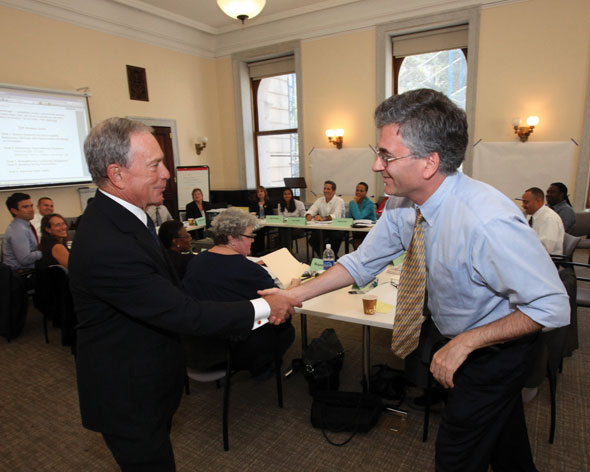alumni profile
Taking a Bite Out of Repeat Crime
Vincent Schiraldi / SSSW ’83
by Sally Lauckner / GSAS ’10
Growing up in the working-class neighborhood of Greenpoint, Brooklyn, in the 1970s, Vincent Schiraldi saw lots of friends and neighbors run into trouble with the law. They were usually sent off to Spofford Juvenile Center in the Bronx, where they would come back, he observed, far from “reformed.” In fact, Schiraldi says, their behavior had usually grown worse. Even as a child, he could tell something was wrong with how the system dealt with offenders; now, as the commissioner of New York City’s Department of Probation, he’s aiming to change that.
Tapped by Mayor Michael Bloomberg to overhaul the department in 2010, Schiraldi believes most probationary programs, which “ask clients to complete bureaucratic, rote activities,” are inherently flawed. He explains: “I would rather see empowerment and programs that enrich clients’ lives and make them less likely to reoffend.” Toward that end, Schiraldi has redesigned the city’s probation department to be more community-based, opening Neighborhood Opportunity Network offices (or NeON) in each of the five boroughs. Previously, clients were expected to report to courthouses in downtown locations. Now they can head to smaller, more neutral spaces—the Manhattan office in Harlem is located in a former school, for example—much closer to their homes.
But Schiraldi says that the concept behind NeON is about more than simple proximity; it allows probation clients to give back to the very communities in which they may have committed crimes, connecting them to neighborhood jobs, civic projects, and religious centers. “We’re requiring our staff to help enmesh the clients in healthy community activities,” Schiraldi says. “When they complete their community service, we want them to do it where they committed their crime and where they’ve lived their whole life.” Under Schiraldi, the department has increased by fourfold the number of probation clients who exit the system early by adhering to requirements and not reoffending. Some 80 percent of people on probation in NYC now complete the system, compared to 65 percent in the rest of the state.
Schiraldi, who currently teaches a course on social policy at the Silver School, first found himself drawn to social service while interning as an undergrad at the New York State Division for Youth (now the Office of Children and Family Services). After receiving his MSW from NYU, he founded the Center on Juvenile and Criminal Justice, which aims to reduce the use of the prison system as a solution to social problems, and then a second nonprofit, the Justice Policy Institute, which examines mass incarceration and the overrepresentation of people of color in the system.
Schiraldi moved to the government side of justice in 2005, when he was asked to reform the Department of Youth Rehabilitation Services in Washington, D.C. After five years, he was happy when Bloomberg called with this latest challenge. “I’m a sprinter, not a long-distance runner in any one place,” Schiraldi explains. “I think a lot of correctional bureaucracy needs to be shaken up, and sometimes the person who does the shaking can’t also be the person who stabilizes it.”
As Schiraldi notes, the D.C. population is about the size of Staten Island, which makes the landscape of New York seem enormous in comparison. But even with an agency of more than 1,000 people, he believes that probation can work better for both offenders and the public. “The goal is to help [probationers] flourish,” Schiraldi says. “And when they flourish, they won’t commit more crimes.”







